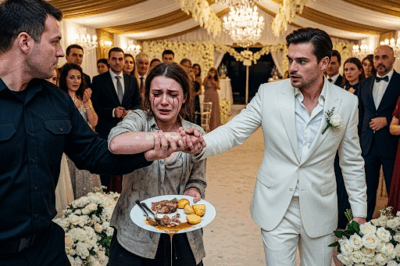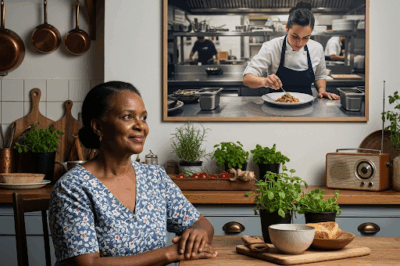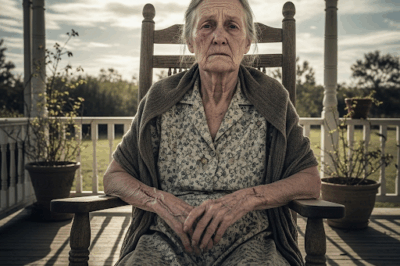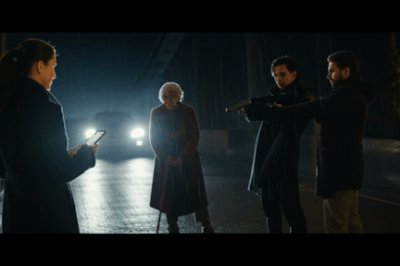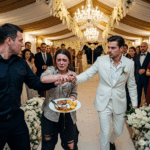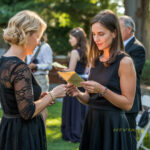Chapter 1: The Encounter
Life has a peculiar way of confronting us with our past when we least expect it.
Marcus Wellington, a forty-two-year-old real estate magnate, had long believed that his heart’s wounds had healed, that the ghosts of his former life were buried beneath layers of wealth, power, and routine. He was about to discover that destiny could be both cruel and merciful.
It was a rainy October afternoon in Manhattan, the kind of day that made the city seem softer, more introspective. Marcus stepped out of his black Maybach, his driver holding an umbrella over him as he walked briskly into Levernardin, one of the city’s most exclusive restaurants. The maître d’ greeted him with the usual reverence, leading him to his habitual table by the window overlooking Seventh Avenue.
Marcus sat, his Armani suit immaculate, his Patek Philippe watch gleaming on his wrist—a portrait of success. He ordered his favorite dish without glancing at the menu, as he always did. The ritual was comforting, a small anchor in a life that often felt adrift.
He gazed out the window, watching the world blur behind streaks of rain. Manhattan’s pulse beat on, indifferent to his solitude. He was surrounded by luxury, yet there was a hollowness inside him that no amount of money could fill.
As he waited, Marcus’s eyes wandered across the restaurant. His gaze settled on a table in the far corner, and suddenly, the air seemed to thin. He froze, his breath caught somewhere between memory and disbelief.
There she was.
Amara.
Five years had passed since he’d last seen her, but time had done nothing to dim her beauty. Her ebony skin glowed under the soft light, her hair coiled elegantly atop her head. That smile—the one that once belonged only to him—now shone for three small children seated beside her.
Triplets.
Three identical faces, each no older than four, with features Marcus recognized instantly. The same piercing green eyes, the same strong jawline, even the same habit of tilting their heads when they were curious—he saw himself reflected in them, unmistakably.
Marcus’s hand trembled. His fork slipped from his grasp and clattered onto his plate, the sound echoing louder than it should have. He felt exposed, as if the whole restaurant could hear the thunderous beating of his heart.
He watched Amara laugh, watched the children giggle as she wiped sauce from one of their chins. For a moment, Marcus was no longer the powerful businessman; he was a man haunted by the choices he’d made, the love he’d lost.
He remembered the last fight they’d had.
Amara had been distant for weeks—coming home late, avoiding his gaze, recoiling from his touch. Marcus, consumed by jealousy and paranoia, had accused her of having an affair. The words they’d hurled at each other that night still echoed in his mind.
“You’ve never really trusted me,” he’d shouted.
“I always feel like you’re hiding something. And you’ve never loved me for who I am,” she’d cried, tears streaming down her face. “I’m just another trophy in your collection.”
That had been their final conversation as husband and wife.
The next morning, Amara was gone. She’d left with nothing but a suitcase, and the signed divorce papers lay on the kitchen table—a silent testament to the end of their marriage.
Now, here she was, radiant and strong, surrounded by children who bore his image. Marcus felt a surge of emotions—shock, longing, regret, and a strange, aching hope.
He watched as Amara glanced up, her eyes scanning the room. Their gazes met.
For a split second, the world seemed to stop.
Chapter 2: Ghosts and Mirrors
Marcus looked away, his mind racing. Should he approach her? Would she even want to see him? He tried to steady his breathing, but the sight of those children—his children, surely—had shattered the composure he’d spent years cultivating.
He reached for his glass of water, his hand unsteady. The maître d’ appeared at his side.
“Mr. Wellington, is everything all right?”
Marcus nodded, forcing a smile. “Yes, thank you.”
But everything was far from all right.
He stole another glance at Amara’s table. The triplets were coloring on placemats, their laughter bubbling up like music. Amara’s gaze lingered on him, her expression unreadable.
Marcus’s mind flooded with memories—the first time he’d met Amara at a charity gala, her laughter ringing out above the crowd, the way she’d challenged him, made him feel alive. Their whirlwind romance had been the envy of New York society. But beneath the glamour, cracks had formed. His insecurity, her need for authenticity, the relentless scrutiny of their world.
He remembered the night she’d left, the emptiness that followed, the way he’d tried to fill the void with work, women, parties. Nothing had soothed him. He’d told himself she was better off, that he was better off, but seeing her now, he knew he’d been lying.
Marcus watched as Amara gathered her children’s things, preparing to leave. He stood abruptly, his chair scraping against the floor. He couldn’t let her walk out of his life again—not without answers.
He crossed the restaurant, each step heavy with uncertainty.
“Amara,” he said softly.
She turned, her eyes widening in surprise. For a moment, neither spoke.
“Marcus,” she replied, her voice steady.
He searched her face, looking for anger, for resentment, but found only calm.
“I… I didn’t expect to see you here,” he managed.
Amara smiled faintly. “It’s a small city, after all.”
He glanced at the children, who stared back at him with curious, identical eyes.
“They’re… beautiful,” he said, his voice trembling.
Amara nodded. “Thank you.”
Marcus hesitated, unsure how to proceed. “Are they…?”
She met his gaze, her expression softening. “Yes, Marcus. They’re yours.”
The words hung between them, heavy and undeniable.
Marcus felt as if the ground had shifted beneath him. He knelt down, meeting the children at eye level.
“Hello,” he said, his voice gentle. “I’m Marcus.”
One of the boys grinned. “Hi, Marcus! I’m Elijah. That’s Isaiah, and she’s Eden.”
Eden, the only girl, smiled shyly, clutching her mother’s hand.
Marcus’s heart ached. He wanted to embrace them, to make up for lost time, but he didn’t know how.
He looked up at Amara. “Why didn’t you tell me?”
Amara sighed, her eyes glistening. “You weren’t ready, Marcus. Neither was I. I needed to protect them, and myself.”
Marcus nodded, understanding more than he cared to admit.
“I want to know them,” he said. “Please.”
Amara studied him for a long moment, then nodded.
“Let’s talk,” she said.
Chapter 3: Truths Unveiled
They sat together at Amara’s table, the children coloring quietly. Marcus felt awkward, out of place, but Amara’s presence soothed him.
“After the divorce, I moved to Harlem,” Amara began. “I needed space, needed to find myself again.”
Marcus listened, guilt gnawing at him.
“I found out I was pregnant a few weeks after I left,” she continued. “I thought about calling you, but… I was scared. I didn’t know if you’d want them, or if you’d try to take them from me.”
Marcus shook his head. “I would never—”
Amara raised a hand. “I know that now. But back then, everything was raw. I had to do what was best for them.”
He nodded, swallowing his pride. “I understand.”
Amara smiled sadly. “It wasn’t easy. Triplets are… a handful. But they’re my joy.”
Marcus watched the children, his children, and felt a wave of love and regret.
“I missed so much,” he whispered.
Amara touched his hand. “You have a chance now, if you want it.”
Marcus nodded, tears stinging his eyes.
“I want to be part of their lives,” he said. “And yours, if you’ll let me.”
Amara studied him, searching for sincerity.
“I don’t know if we can ever go back,” she said. “But maybe we can move forward.”
Marcus smiled, hope blossoming inside him.
“I’d like that,” he said.
Chapter 4: Bridges
Over the next few weeks, Marcus made every effort to be present. He met Amara and the children at parks, museums, and their modest apartment in Harlem. He learned to braid Eden’s hair, to play soccer with Elijah and Isaiah, to read bedtime stories.
The children warmed to him quickly. They asked questions about his life, his work, his favorite foods. Marcus found himself opening up, sharing stories he’d never told anyone.
Amara watched him, her heart softening. She saw how Marcus struggled to connect, how he fought his own insecurities. She remembered the man she’d fallen in love with—the one who’d made her feel seen, cherished.
One evening, after the children were asleep, Marcus and Amara sat on her balcony, watching the city lights.
“I’m sorry,” Marcus said quietly. “For everything.”
Amara nodded. “I know. I’m sorry too.”
They sat in silence, the past stretching between them like a chasm.
“I want to try again,” Marcus said. “Not as the man I was, but as the man I hope to be.”
Amara smiled, tears glistening. “Let’s take it slow.”
Marcus reached for her hand, and she let him.
Chapter 5: Healing
As autumn faded into winter, Marcus became a fixture in Amara’s life. He attended school events, helped with homework, cooked dinners. He reveled in the chaos, the laughter, the love.
He also faced challenges. The children asked hard questions—why hadn’t he been there before? Did he love their mother? Marcus answered honestly, admitting his faults, promising to do better.
Amara struggled too. She feared letting Marcus back in, feared being hurt again. But she saw his effort, his vulnerability, and slowly, her walls crumbled.
They began to heal, together.
Marcus offered to move them into a larger apartment, but Amara refused.
“We don’t need your money,” she said. “We need you.”
Marcus understood. He scaled back his work, prioritized his family. He learned to find joy in small moments—a shared meal, a quiet walk, a child’s laughter.
He realized that love was not about possession, but presence.
Chapter 6: Reunion
By spring, Marcus and Amara had rebuilt something fragile and beautiful. The children thrived, their laughter filling the home.
One sunny afternoon, Marcus took Amara and the triplets to Central Park. They picnicked under a blossoming cherry tree, the city alive around them.
Marcus watched Amara laugh with the children, her eyes shining. He felt a surge of gratitude—a second chance he never thought he’d have.
He took her hand, his voice trembling.
“I love you, Amara. I always have.”
Amara smiled, her heart full.
“I love you too, Marcus. But this time, let’s do it right.”
He nodded, tears in his eyes.
They embraced, the children piling onto their laps, giggling.
For the first time in years, Marcus felt whole.
Chapter 7: Reflections
Years passed. Marcus and Amara married again, quietly, surrounded by friends and family. The triplets grew, each forging their own path, their father’s eyes and mother’s spirit guiding them.
Marcus built a new legacy—not of wealth, but of love. He supported Amara’s work in the community, invested in affordable housing, mentored young entrepreneurs.
He learned that happiness was not found in boardrooms or bank accounts, but in the laughter around the dinner table, the warmth of a hand in his, the quiet certainty of belonging.
Sometimes, on rainy October afternoons, Marcus would sit by the window with Amara, watching the city blur behind streaks of rain. He would remember the day fate brought him face to face with his past, and thank the universe for its peculiar mercy.
The wounds of the heart never fully heal, but with love, they become scars—reminders of where we’ve been, and how far we’ve come.
Epilogue: The Second Chance
Amara’s restaurant grew, becoming a hub for families and friends in Harlem. Marcus, now less visible in the world of headlines, became known for his generosity and quiet strength. Their children, Elijah, Isaiah, and Eden, flourished—curious, kind, and resilient.
On the anniversary of their reunion at Levernardin, Marcus reserved the same corner table. They celebrated not with extravagance, but with gratitude—grateful for the rain that brought them together, for forgiveness, for the courage to try again.
And when Marcus looked at Amara, he saw not just the love of his life, but the woman who had taught him that real wealth was measured in moments, in healing, in hope.
The past would always be part of them, but the future was theirs to build—one rainy day at a time.
News
La música flotaba en el aire como perfume caro, mezclándose con las risas y conversaciones de doscientos invitados vestidos de gala
Capítulo 1: Bajo la carpa blanca La música flotaba en el aire como perfume caro, mezclándose con las risas y…
La primera vez que Adaeze cerró la puerta con llave después de que terminamos de hacer el amor, no le di importancia.
Capítulo 1: El primer cierre La primera vez que Adaeze cerró la puerta con llave después de que terminamos de…
La Noche de los Susurros
Capítulo 1: El llamado Pasada la medianoche, el silencio era absoluto en nuestra casa de Khayelitsha. El aire estaba quieto,…
La madre de los sabores
Capítulo 1: El inicio invisible Me llamo Nala Mkhize, aunque en la casa Van der Merwe todos me conocen como…
La mecedora de los silencios
Capítulo 1: El regreso de la sombra La calle estaba empapada. El cielo parecía no tener fondo y la lluvia…
BROKEN MIRROR
Chapter 1: Shadows Under the Bridge Nathan Graham had lived in the shadows for so long that the city itself…
End of content
No more pages to load

